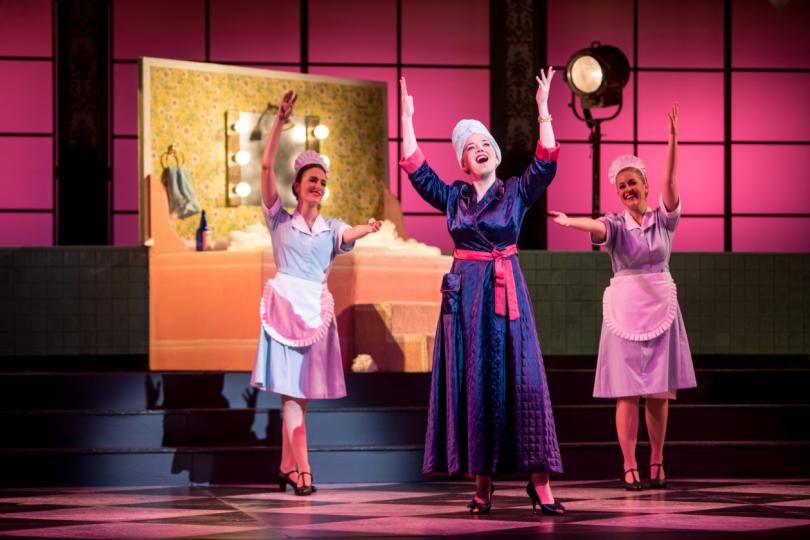The Buffoon & The Minx

“Opera is when a guy gets stabbed in the back and, instead of bleeding, he sings.”
“Of all the noises known to man, opera is the most expensive.”
Let’s be honest, the perception of opera is full of stereotypes. The grandiose Wagnerian costumes with horns and spears, Bugs Bunny conducting that tenor, capes, opera glasses: It’s easy to get the impression that the world of opera is off-putting to outsiders. There are a lot of stereotypes… hundreds of year’s worth. For first-time attendees, any operatic production has to overcome all of them. When a non-opera fan goes to a production, it has to be so great that it overturns a lifetime of bad publicity and justifies the existence of the art form itself. Which is a lot of pressure. We don’t judge all movies by the most recent work of Nicolas Cage or all songs by Nickelback’s latest album so how dare we expect every operatic production to be brilliant? Yet we do. Luckily, MN Opera’s Don Pasquale is brilliant in every way you could imagine.
To use a grandiose term popularized by the most grandiose of operatic composers, MN Opera’s production is a gesamtkunstwerk: a total work of art. The singers are tremendous, the orchestra is perfection, the staging, the costumes, the lights, the film (more on that in a second), the physical humor, the Ordway theater itself, an autumn evening in St. Paul - every piece of the audience member’s experience is a triumph. Live opera is a superhuman thing: The 4 leads are singing in Italian so clearly you can understand each word, so loudly they don’t get amplified in the 2200 seat house, while acting to great comic effect, all while watching the conductor and hitting their marks on the stage. Leading man Craig Colclough was tremendous: With equal attention given to his singing and his acting, he was both impressive and hilarious. His ‘pantaloon’ character of a buffoon demanded a great deal of physical humor which was delivered with ease. Soprano Susannah Biller commanded the stage both vocally and physically. Her bold and subtle voice provided the most gripping musical moments of the night and her stage presence was the focal point of the entire show.
Don Pasquale premiered in 1843. It was a later work of Donizetti, who was wildly popular at the time and whose work was expected to be a hit. The form of the story and the characters were not new or revolutionary even in their day, they are admittedly stock characters of; the old buffoon, his naïve nephew, his love interest, the conman, and the fake notary. Nothing about this play is startling or particularly unique. Which makes it extra impressive that this particular production of the old piece was so clearly intriguing.
Using new footage (in the style of the silent film era), musical overtures were accompanied by projected silent films that gave backstory to the characters and the world of the story. This was matched by clear and focused staging, costumes, sets, and lights that clearly pitted the old man (stuck in the black and white era) against the younger generation (in Technicolor). Though the text is antiquated, the story felt new… which is not to say that the story feels relevant. The tale itself is a simple plot that entertains the audience for a few hours but doesn’t offer much insight into any part of the human condition. It’s essentially a ‘heist’ story of a strong female protagonist and her colleagues trying to pull a fast one on the rich old fool. For much of the story it appears that our main characters are interested solely in wealth but in the 11th hour they prove pure of heart and they’re interested only in love. The plot isn’t new now, nor was it then. Arguably, the plot doesn’t really matter so long as it allows the singers and orchestra the chance to flex their muscles, but I digress.
Now back to the elephant in the room… about those stereotypes and the implied question: Is opera elitist? On the whole, I’m not sure. That’s a huge question with a lot of moving parts. What I do feel confident in answering is the smaller question: Is Minnesota Opera elitist?
To which the answer is no.
This production was incredibly inviting to the audience. The story was laid out clearly and made accessible to anyone regardless of their knowledge of operatic repertoire. The show didn’t have any inside jokes that excluded a handful of audience members; it relied on making tremendous music and funny acting. Nothing elitist about that.
As for the audience culture MN Opera fosters: It’s true that some opera patrons dress “to the nines” but many ‘dads’ in the audience were wearing plaid shirts tucked into khakis like you’d see at a high school play. Some opera patrons go to Meritage for oysters and martinis before the show, some go to Mickey’s Diner. Some pay $165 for a ticket, some pay $25 (it’s worth a comparison that tickets to this weekend’s Vikings game range from $105-$550). So as easy as it is for non-opera goers to stereotype that opera ‘just isn’t for them’, MN Opera is showing you that it can be. If you like opera, see this production. If you don’t like opera but you’re open to new experiences, see this production. If you don’t like opera and you’re not open to new experiences, well then your fate is out of my hands.
I do have 2 critiques of this production. Number 1: this was an incredibly not-diverse cast. I think this is worth mentioning in the world of opera because the Metropolitan Opera was still using blackface up until 2013 – that’s not a typo, there was only a 3 year gap between the end of blackface and the release of Hamilton. Number 2: I’m not convinced that Don Pasquale is very relevant or meaningful to the world in which we live. I have a lot more to say about that but I’ll save that for another post (linked below). That being said, I understand why MN Opera programs it: because audiences love it for some reason that eludes me.
This is where my review of Don Pasquale ends. Go see it.
This is where my larger thoughts about the culture of opera begin. Leaving the Ordway I was left with a thousand questions…who is opera for?
MN Opera is doing a great job of making it accessible to everyone but not everyone is going. It’s primarily a Caucasian audience between the ages of 50 and 70 who appear to be doing very well financially. Why is this the audience for opera? Why do these audiences love opera so much? Particularly old frivolous opera? According to the printed program, Donizetti wrote this opera in eleven days. Was there magic in the water during those 11 days? Did he stumble upon infinite insight that we’re still trying to understand today? No. The show was decent then and it’s decent now. So why do we still prioritize it above other works that are truly more exceptional and timely? MN Opera has a back-catalog of 45 original operas they’ve commissioned in their history – I’d rather see some of those brought back to life. Why do we prefer the things we think are traditional? This production team could make any piece incredible. Why do we keep elevating the existing canon of work rather than encouraging more inventive pieces? I’d really like to figure this out – if we can figure out why it happens in opera maybe we can figure out why it happens in other parts of our culture. If you’re intrigued by this tip of the zeitgeist iceberg I’ve presented, please check out the rest of my thoughts here.




